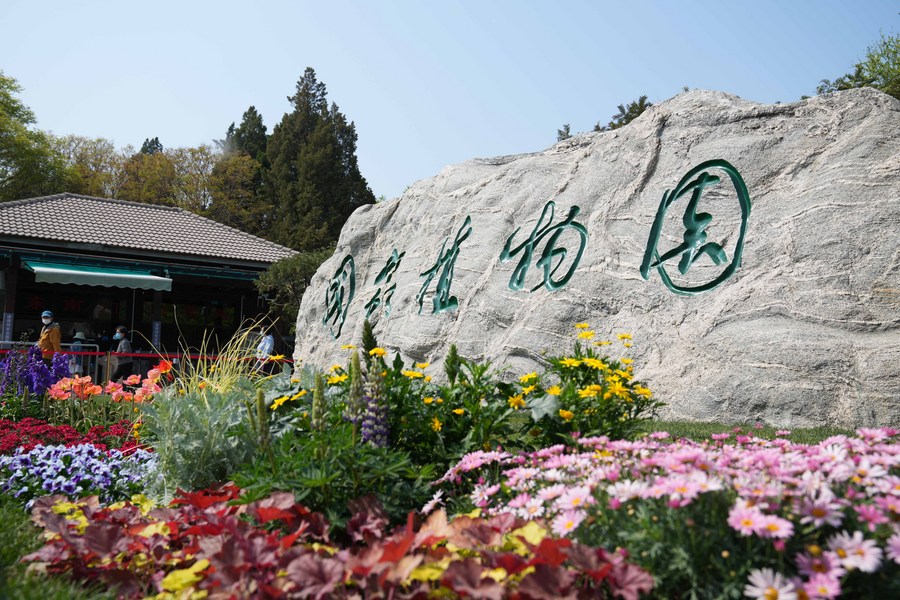

Photo taken on April 18, 2022 shows the entrance of the China National Botanical Garden in Beijing, capital of China. (Xinhua/Ju Huanzong)
As the China National Botanical Garden was officially inaugurated in Beijing in April, the country has built a new "Noah's Ark" for plant-diversity protection.
The national botanical garden builds upon the work of the Institute of Botany under the Chinese Academy of Sciences (CAS) and the Beijing Botanical Garden.
With more than 30,000 kinds of plants and 5 million representative plant specimens from five continents, the arboretum is a significant symbol of the country's sustainable development level.
AS BIG AS PROFESSIONAL
With a planned area of 600 hectares and 15,000 species of ex-situ protected plants, the national botanical garden features scientific botanical research, ex-situ conservation, and ecological leisure tourism.
"An extensive collection of species is a fundamental feature of the national botanical garden, which makes it different from other botanical gardens," Said Ye Jianfei, senior engineer of the Institute of Botany under the CAS.
Scientific research capabilities provide strong support for the national botanical garden, said Ye.
High-level international cooperation has also been carried out with over 50 research institutions from over 30 countries in plant diversity, ecological environment, and agriculture.
EX-SITU CONSERVATION
To protect the plant diversity of China, ex-situ conservation is considered a major task.
Ex-situ conservation refers to relocating endangered, endemic species or species of notable economic value from their origin to professional institutions like botanical gardens for protection, including the establishment of germplasm resource banks to preserve plant seeds, tissues, and organs, said Ye.
As a top priority of the national botanical garden, ex-situ conservation is not just about removing plants from their natural habitat and placing it in a new location. "More importantly, it is about conducting comprehensive scientific research on endangered species," said Dr. Wang Kang, curator of the plant museum at the national botanical garden.
After a series of human interventions to ensure the number and genetic diversity of such species, they will be reintroduced back into the wild if conditions allow for promoting the recovery of wild species, Wang added.
A BIGGER SYSTEM EMERGING
Besides Beijing, China is accelerating the construction of a system of national botanical gardens in places like southern city of Guangzhou to strengthen biodiversity protection.
The national botanical garden system aims to be an integrated ex-situ conservation network covering main climate zones and ecosystem types nationwide.
"Building a national botanical gardens system is of great significance," said Zhou Zhihua, an official with China's National Forestry and Grassland Administration, noting that such a network will boost cooperation and resource-sharing and enhance the stability and reliability of biodiversity protection.
With another national botanical garden in Guangzhou in the making, the country aims to gradually bring over 85 percent of its native wild plant species and all key protected plant types under ex-situ conservation with these national botanical gardens, said Zhou. (Xinhua)

86-10-68597521 (day)
86-10-68597289 (night)

52 Sanlihe Rd., Xicheng District,
Beijing, China (100864)

